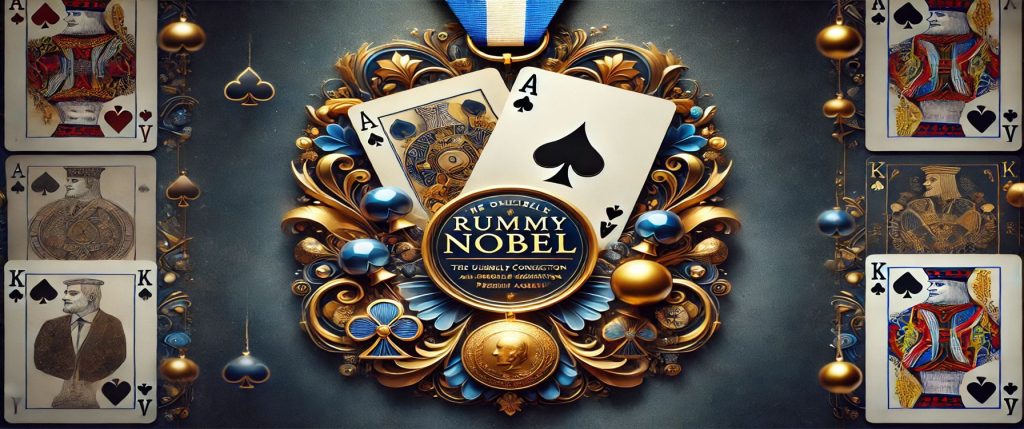Description

The Intellectual Game of Rummy Nobel: An in-depth exploration of its history, impact, and cultural significance Rummy Nobel is a captivating card game that has become popular with players of all ages. Its origins are deeply ingrained in the lengthy history of card games. It is thought that traditional rummy, which dates back to the early 19th century, is where the game originated.
Rummy Nobel maintains the idea that the original rummy games involved matching cards in sets or runs using a standard deck of cards. But what distinguishes Rummy Nobel is its special twist, which combines aspects of strategy & intellectual engagement, turning it from a simple hobby into a mental workout. Both casual players and dedicated strategists will find the game appealing because it was made to test players’ cognitive capacities while offering a fun experience. In Rummy Nobel, the name “Nobel” alludes to the renowned Nobel Prize, which honors exceptional contributions to humanity in a variety of domains, including science, literature, and peace. The game is elevated above simple amusement by this association, which represents a celebration of intellectual prowess.
In order to encourage a friendly yet competitive atmosphere where players could practice strategic thinking and problem-solving, the game was created. As it grew in popularity, Rummy Nobel came to represent intellectual rigor, drawing players who valued the combination of enjoyment and mental challenge. Rummy Nobel has been able to establish a niche for itself in the card game industry thanks to this special combination, which appeals to people looking for both intellectual and recreational stimulation. Advantages of Card Games for the Brain. It has long been known that playing card games can improve strategic thinking and cognitive abilities.
Players of games like Rummy Nobel must consider their moves carefully, predict the tactics of their opponents, and make decisions based on insufficient information. Players must continuously modify their tactics in this dynamic, which develops their analytical abilities. enhancing mental capacity. Regularly playing card games has been found to enhance memory, focus, and problem-solving skills.
Gamers gain the ability to weigh risks and rewards, making well-considered choices that could result in victory or defeat. Also, it is impossible to ignore the social component of card games. Engaging with others & having emotional intelligence. Playing Rummy Nobel frequently requires interacting with other players, which makes the game even more difficult.
Players need to read the actions and intentions of their opponents in addition to concentrating on their own strategies. As players learn to compromise, convince, and occasionally bluff, this social interaction improves communication and emotional intelligence. expanding one’s intellectual horizons. Rummy Nobel is a fantastic tool for cultivating a well-rounded intellect because it combines strategic thinking with social interaction.
Players who fully immerse themselves in the game develop abilities that they can use in a variety of real-life contexts, such as academic endeavors or professional settings. Rummy Nobel might appear to be a straightforward card game at first, but upon closer inspection, there are fascinating similarities between its principles and the attributes honored by the Nobel Prize. Both demand a combination of ingenuity, strategic vision, and tenacity. Similar to the creative thinking frequently exhibited by Nobel laureates, players in Rummy Nobel must come up with novel ways to outmaneuver their rivals while adjusting to shifting conditions.
In the same way that writers or scientists must solve difficult problems and come up with novel solutions, rummy players must use creativity to come up with winning combinations. Also, the significance of cooperation & competition is emphasized by both Rummy Nobel & Nobel Prize-winning accomplishments. Although individual achievements are acknowledged by the Nobel Prize, many laureates have collaborated with others or their communities to accomplish their objectives. Rummy Nobel promotes interaction among players, encouraging a healthy spirit of competition that can result in learning and growth for both parties.
The game functions as a miniature representation of the larger intellectual environment, where teamwork frequently produces ground-breaking findings. In this way, Rummy Nobel not only provides entertainment but also exemplifies the spirit of excellence, which is a philosophy that strongly aligns with the principles of the Nobel Prize. Rummy Nobel has evolved from being just a card game over time to becoming a representation of intellectual success in many different contexts. The game has been accepted by academic institutions & intellectual circles as a means of encouraging professionals and students to think critically and plan strategically. Rummy Nobel tournaments & competitions have sprung up all over the world, enhancing the game’s standing as an intellectual pastime rather than merely a pastime. Participants in these events are frequently eager to demonstrate their abilities and network with like-minded people who are passionate about strategic thinking.
The game’s branding and marketing tactics serve to further solidify its association with intellectual success. Rummy Nobel establishes itself as more than just entertainment by associating with the esteemed Nobel Prize; it becomes a platform for people to push their intellectual limits while savoring the companionship of other players. Teachers who are aware of the game’s potential as a teaching tool that fosters cognitive development have taken notice of this branding. Because of this, Rummy Nobel has made its way into academic settings and classrooms, where it is used to teach ideas like probability, strategy development, and critical analysis—skills that are highly valued in both academic and professional contexts. Players’ ability to think critically and solve problems is greatly enhanced by Rummy Nobel.
The design of the game forces players to constantly assess their options while taking into account both their own and their opponents’ strategies. Every turn offers fresh difficulties that call for quick thinking and flexibility; players must assess the potential of their hand while predicting how their decisions will impact the dynamics of the game as a whole. Players’ analytical abilities are honed by this continuous mental activity, which also motivates them to plan ahead, which is crucial for solving problems successfully.
Rummy Nobel also creates an atmosphere in which failing is not only tolerated but also seen as a chance for improvement. Gamers discover that not all tactics will be successful and that they occasionally need to reevaluate their strategy in light of past results. This iterative process simulates real-world problem-solving situations where people have to modify their approaches in response to feedback and evolving conditions. Through the development of resilience and adaptability via gameplay, Rummy Nobel gives players vital abilities that transcend the card table and are applicable to problems in daily life.
In academic and professional circles, the popularity of Rummy Nobel has had a big impact on how people view card games. Card games, which were once thought of as merely recreational or entertainment pursuits, are now more widely acknowledged for their capacity to improve cognitive abilities and promote cooperation. The idea that card games aren’t useful for teaching is being challenged by educators who include games like Rummy Nobel in their curricula. This change in perspective emphasizes the value of play in educational settings & shows how interesting activities can result in significant skill development. In work environments, Rummy Nobel has become a popular team-building activity that encourages cooperation & strategic thinking among coworkers.
Businesses are starting to see how adding games to training programs can help team members communicate better & strengthen problem-solving skills. Participating in Rummy Nobel sessions allows staff members to gain valuable skills in a laid-back setting that promotes innovation and creativity. This shifting viewpoint presents card games as useful resources for both professional and personal growth, in addition to being enjoyable recreational activities.
Because it honors intellectual accomplishment in all its forms, the Rummy Nobel has cultural significance. A reminder of the value of education, imagination, and tenacity in attaining greatness is provided by the game’s association with the Nobel Prize. Since intellectual endeavors are highly prized in many cultures, Rummy Nobel appeals to people who want to use their skills and efforts to make a significant contribution to society.
Players who play this game take part in a cultural narrative that celebrates individuals who have made important contributions in a variety of fields. Also, by uniting people from various backgrounds who have a shared interest in intellectual challenges, Rummy Nobel promotes community engagement. Participants who might not otherwise interact can network and work together through tournaments. This sense of community serves to further the notion that intellectual success is a shared journey enhanced by knowledge sharing and experiences rather than merely an individual pursuit.
Because of this, Rummy Nobel transcends its status as a game and becomes a cultural phenomenon that honors human intelligence in all of its manifestations. As Rummy Nobel continues to gain popularity among a variety of audiences around the world, the game’s future looks bright. Its distinctive fusion of intellectual challenge, social interaction, and strategy makes it ideally suited for future incorporation into professional development initiatives and educational systems. As more educational institutions realize how beneficial it is to include games in the classroom, Rummy Nobel might end up becoming a mainstay in curricula meant to help students develop critically thinking abilities. Also, Rummy Nobel has the potential to impact recognition programs and prestigious awards outside of its current purview. Similar to how the game is based on the principles of the Nobel Prize, it may lead to new kinds of acknowledgment for people who are exceptionally good at solving problems or thinking strategically in a variety of fields.
Society could further honor intellectual accomplishments in ways that are consistent with modern values by creating prizes or contests based on the Rummy Nobel principles, such as originality in strategy development or skill in cooperative gaming. To sum up, Rummy Nobel honors human ingenuity while providing players with an entertaining platform for honing critical thinking abilities. It is a game that straddles the line between intellectual achievement and entertainment. Originally derived from card games, it has since developed into a universally recognized symbol of cognitive ability. Looking ahead, Rummy Nobel’s impact is expected to grow even more in the fields of academia and the workplace while maintaining its ability to motivate people to pursue greatness.


